If you’ve been thinking about starting composting, now is a great time to do so…
…just in time for planting season and when most cities are set to resume trash collection.
Composting is a terrific way to lower your carbon footprint…
…by turning your table scraps into natural soil-enriching fertilizer with very little work…
…whether you live in a city with a small kitchen or live in a house with room for a backyard garden.
Hear it from Hailey!
It’s always a better choice to do something greener for the environment…
It won’t only benefit us for the time being, but also the generations after us…
This is why I compost for my garden since several years ago…
Composting not only helps reduce waste, but it also enhance the earth’s soil…
Throughout my composting years, I’ve had lots of prospering greeneries…
Well, I wouldn’t completely thank compost for it…
… but compost had surely boost that kind of prosperity!
It’s just that, as long as we are still capable of doing something for this earth…
… do it now and prevent regrets from haunting us.
That’s a solid argument…
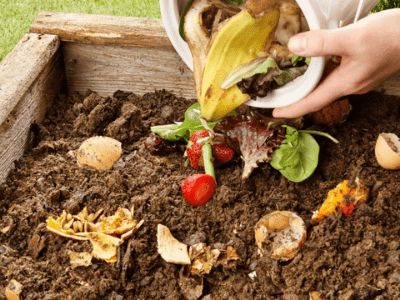
Composting is simple and does not necessitate the use of any special equipment (or worms!)
It’s easy to accomplish on a kitchen counter, in a medium-sized bucket or pot, or in any covered container.
All you have to do is begin with scraps…
Not just any scraps, but veggies, leaves, peels, seeds… and everything else that comes from a ground-based plant.
Think about all the organic scraps you throw away in a day…
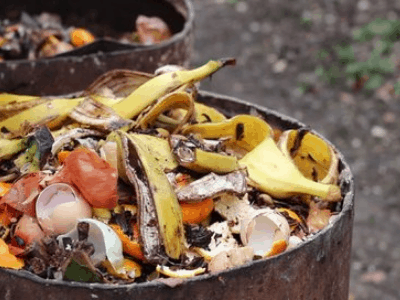
Avocado pits and peels, carrot tops, orange peels, broccoli stalks and leaves, and artichoke leaves, to name a few…
…also green pepper seeds, melon guts, and even coffee grounds are all scraps that can now be thrown away.
What doesn’t make it into your trash can? Animal-based products…
That includes meat, as well as anything else that came from an animal or was a result…
Butter, bones, meat scraps, mayo, chicken skin, and eggs are among the ingredients.
All you have to do is begin with scraps…
Not just any leftovers, but vegetable scraps, leaves, peels, seeds, etc.
…as well as anything that comes from a ground-based plant.
Avocado pits and peels, carrot tops, orange peels, broccoli stalks and leaves, and artichoke leaves, to name a few…
… Green pepper seeds, melon guts, and even coffee grounds are all scraps that can now be thrown away.
What doesn’t make it into your trash can? Animal-based products…
That includes meat, as well as anything else that came from an animal or was a result…
Butter, bones, meat scraps, mayo, chicken skin, and eggs are among the ingredients.
All you have to do is begin with scraps…
Not just any leftovers, but vegetable scraps, leaves, peels, seeds, etc.
…as well as anything that comes from a ground-based plant.
However, eggshells can be used as long as they are completely devoid of whites and yolk…
Coffee grounds and tea leaves, plant stalks or branches, and leaves are also good additions…
Consider the following scenario: Animals rot, while plants decompose and return to the soil, bringing with them all of the valuable nutrients…
….such as nitrogen and minerals, that were used to grow them in the first place.
It’s enjoyable once you get started, and you’ll find that you’re able to reduce your home waste…
…and need to take out the garbage about half as often.
Think of it this way: Animals rot, while plants break down and turn back into the soil…
… bringing with this process all of the rich nutrients…
… like nitrogen and minerals used to grow them in the first place.
Once you get started, it’s fun and you end up reducing your household waste…
… and need to take out the garbage to about half as often.
Why Should You Compost?
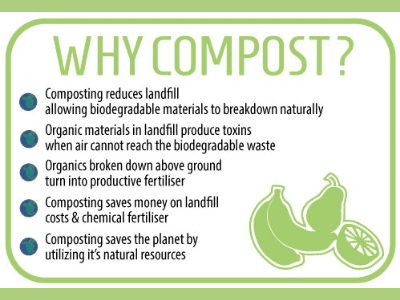
Not only does it lower your overall waste and the amount of garbage you produce at home…
But it all comes together to form black soil rich with mineral topper that aids in the growth of your plants.
It then functions as a natural non-chemical fertilizer, kills parasites, and eventually feeds both the soil and the plant…
…to replenish minerals and nitrogen lost during the developing process.
It’s like giving back and paying it forward all at once…
…but the beneficiary of this generosity are plants and the planet.
Composting is the human version of re-creating what mother nature does out in the wild: Taking a controlled space and mixing together various organic materials in magical cocktails or recipes appropriate to the system.
Rebecca Louie, the founder of the Compostess website and author of Compost City
Take your tiny container full of leftovers outside once you’ve started…
It can sit for weeks or even months, melding everything together…
When you sprinkle it on the soil…
…where your plants are growing, it decomposes into a dark rich soil additive that works as plant food or enhancer…
…and supplies them with a nitrogen-rich fertilizer that feeds them and helps them flourish.
Here’s everything you need to get started…
Read this before you throw your next apple core or peel into the garbage…
Composting For Beginners
You presumably recycle already, which is fantastic for the environment…
The next logical step is to begin composting…
…which will not only drastically reduce your garbage volume and waste…
…but will also produce a rich fertilizer to add to your plants, which will be beneficial to them…
…and will help you replace chemical fertilizers that you may have used previously.
Composting is simple, and anyone can do it if they follow a few simple rules…
First: Why Should You Start to Compost?
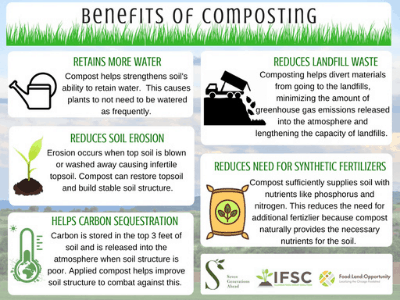
Anyone who wishes to reduce their carbon footprint, cut overall waste production…
…lessen their environmental effect while also helping local farmers or community gardening.
Compost as a chemical-free fertilizer can help you grow more organically.
Composting our organic waste and feeding that rich soil back to local organic crops will cut methane from landfills…
…which accounts for 30% of our overall greenhouse gas emissions (including the resources used to grow it).
When you get into gardening, the next step is to start…
Alternatively, if you live in a city and want to limit your waste, composting is a terrific option to do so…
It’s essentially the act of gathering all of your organic waste in one place…
This can include garden waste or yard leaves, plant-based culinary scraps…
…apart from all meat, dairy, poultry, or seafood products, and beans, seeds, tea leaves, coffee grounds…
…that you would normally throw away.
It begins to decompose and eventually transforms into a rich, dark, deep soil…
…that may be utilized as fertilizer, plant nutrition, and food.
Second: What is Composting and How Does It Work?
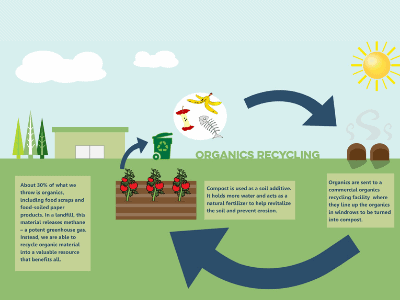
Composting is the process of repurposing organic waste by returning it to its natural state…
…a dark, nutrient-rich soil ideal for growing plants and vegetables.
It may be weird to collect your scraps…
Unless you grew up on a farm–and compost is “black gold” to farmers who use it to fertilize their crops and plants…
…but even as a city dweller used to throwing out everything in the same bin.
Once you start composting, you realize: It’s easy, it doesn’t smell…
When you start composting, you’ll see that it’s simple, it doesn’t stink, and it cuts your family’s trash in half.
If you eat a plant-based diet, your typical garbage won’t smell at all…
…since the bulk of the other rubbish you make will be clean and recyclable.
Composting is the most effective strategy to lessen your carbon footprint…
…and it will teach you about local community gardens that will take up your compost if you don’t have a purpose for it in your yard or house.
Third: How do You Start Your Compost?

Get a bin first. Alternatively, use an old pot and lid until it arrives…
Place it near where you chop veggies or make smoothies on the side of your counter…
Throw the tips, skins, peels, and seeds into the bin as you chop and set it aside…
It might look a little ripe or moldy after a few days, but it won’t smell…
Unless you accidentally add an animal product like milk or butter, which you should avoid.
You’ll see that the compost shrinks as you add more materials…
Your scrap pile will be less than half its initial size once it has fully decomposed…
…as the materials degrade and reduce to their most basic nutrients.
A filter should be placed on top of the bin to absorb any gasses released by the veggies.
When your bin is full, you can either drop it off at a nearby center or have it picked up…
In your neighborhood, finding a drop-off location is simple.
Fourth: What do You do with Your Compost?

Many city composting initiatives that had been stalled…
…are now being restarted, and cities, including New York.
They are beginning their pick-up or drop-off composting operations as COVID-19 limitations begin to lift.
All you have to do is dial 311 and ask to have your building or neighborhood included to the collection schedule.
If you reside in San Francisco, Seattle, or any city where composting is required, you’re in luck.
Find out how to get your scraps picked up or where you can drop them off by contacting the recycling authority in your town.
Some community gardens will even trade crops for compost…
…or sell fresh vegetables at a reduced price.
If you do a little investigation, you’ll find drop-off locations and even pick-up services.
GrowNYC, for example, established local drop-off locations to encourage people to compost…
…and to assist the city’s increasing “brown bin” recycling program.
However, when composting in the city came to a halt in March owing to COVID-19 limitations…
…one young architect named Vivian Lin began a compost collection business…
…and for a nominal price, she will also drop off organic vegetables when she picks it up.
For more information, her company’s name is GroundCycle, and it’s a growing one…
San Francisco has had a mandated compost recycling program in existence since the 1980s, when it began its first composting program…
If your town or city does not yet have a dedicated program, contact your local councilman or woman and suggest that one be established.
If you live in New York…
The pickup locations are scattered throughout the city, and the program is about to resume…
So look for a drop-off location near you or call 311 to schedule a pickup before August 1, 2021…
…because the city will resume its “brown bin” recycling program this fall.
Five: Doesn’t It Start To Smell?
Most countertop compost bins have a little charcoal filter at the top that reduces odors…
If your compost starts to smell, simply empty it out of the tiny bucket on the kitchen counter… and into the larger container in the backyard.
If it starts to smell gamey, add additional untreated sawdust or coffee grounds… both absorb moisture and drain the scent…
…of the disintegrating materials, which are frequently the wetter ones, such as fruit scraps.
Pitchfork it, poke it, stir it, or turn it over to allow some of the gases to escape into the air.
To avoid breathing the unpleasant odors, wear a mask or bandana.
Do You Need Worms Or Bugs To Start Composting?
No. Worms, other bugs, or creepy crawlers are not necessary additions to your compost…
Once in the garden or outside, they’ll very certainly find their way into your outdoor container…
…but in either instance, the molecules will degrade on their own.
A countertop container with a lid…
…which can also be a particular bucket with a charcoal filter to absorb the smell…
…and an outdoor area to dump your scraps onto are the two things you’ll need.
Since you can turn the composting once a week or so…
…and maintain it mulching and moving through its natural paces…
…the rotating drum is a great addition to your backyard (just hide it out of sight).
Alternate from side to side while adding objects to maintain the composting decomposing evenly…
…so you’ll always have one side that’s more ready to be spread on your plants than the other.
Why Is Composting Popular?
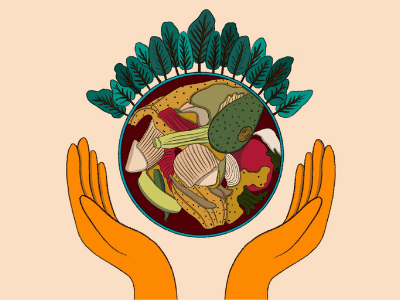
Composting is becoming increasingly popular across the country as more people discover it’s a simple method to help the environment…
…reduce your carbon footprint, recycle effectively, and pay it forward…
…to the future growth of organic gardening and help grow plants without chemicals.
Go to CompostNow…
to find out about recycling pick-up and drop-off near you, and if your local recycling services don’t include it, ask your officials to start it.
Alternatively, contact your local community farm or garden and see if you can drop off “black gold” to assist them in growing their organic produce faster and healthier…
…as well as a place to deposit your scraps outside.
Since you can turn the composting once a week or so…
…and maintain it mulching and moving through its natural paces…
…the rotating drum is a great addition to your backyard (just hide it out of sight).
Alternate from side to side while adding objects to maintain the composting decomposing evenly…
…so you’ll always have one side that’s more ready to be spread on your plants than the other.
To sum it up…
It’s never too late to start, especially with gardening tips and tricks…
Composting will not only benefit you, but also this earth we live in…
There are also a lot of channels of composting nowadays…
… where you may get your beginner’s information…
… or give you service on matters of composting. Just ask!
It’s time for you to start now!
Conclusion
If you happen to already start composting, let us know…
Comment down below on your experience or further queries you might have…
It would be our pleasure if you contact us too…
Check out more posts on our website like this one here!
Have an awesome gardening journey!

